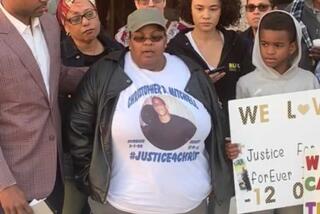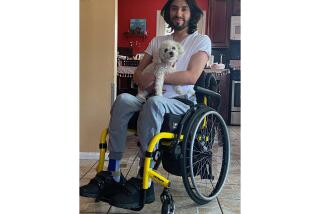O.C. prosecutors must drop murder case, panel rules
Two men who served prison sentences for the attempted murder of an Orange County sheriff’s sergeant three decades ago cannot be tried for murder after the sergeant, who was paralyzed, died of his injuries last year, a court of appeal ruled.
The murder case against Robert Duston Strong and David Michael Knick must be dropped because at the time of the shooting, a victim had to have died within three years and a day of the crime to face a murder charge, the appeals panel ruled.
The Orange County district attorney’s office filed murder charges against Strong and Knick after Sgt. Ira Essoe, whose legs were amputated as a result of the shooting, died last year.
Prosecutors argue the bullet wounds led to Essoe’s death, and there is no statutory limitations on murder in California.
Prosecutors have 15 days from Monday’s ruling by the 4th District Court of Appeal to appeal to the state Supreme Court. Deputy Orange County Dist. Atty. Scott Simmons said they are reviewing the decision and will decide whether to appeal in the next few days.
Knick, 54, of Yucca Valley, and Strong, 55, of Riverside, have been in an Orange County jail for nine months.
They had already been convicted of the attempted murder of Essoe in an Orange mall parking lot in 1980 when he came upon them burglarizing cars with a third man.
The three-justice panel said the case came down to a 1997 revision to the law that now allows prosecution of a murder case no matter how long it takes the victim to die.
That law eliminated the requirement that a death occur within three years and a day of the crime.
The panel ruled Knick and Strong could not be subject to a law passed after the crime. It agreed with their attorneys that the statute of limitations in place in 1980 applied.
The justices cited a U.S. Supreme Court case that found a similar change made to extend the statute for sex crimes could not be applied to older offenses.
The case precludes hundreds of Catholic priests from being tried for decades-old molestation incidents.
“The district attorney suggests the time bar was never triggered because a murder is not ‘complete’ until the victim dies … and therefore, even conceding the statute imposes a time limitation, it did not begin to run until Essoe died,” Justice J. Aronson wrote for the panel.
In November 1980, Essoe and Deputy Greg Brown were on duty in plainclothes in an unmarked vehicle when they saw three men in the mall parking lot standing in front of the raised hood of a yellow Mustang.
A few minutes later, the deputies saw them standing next to a black Mustang with an open hood.
When Essoe and Brown confronted the men, Strong pointed a gun at Brown and demanded that he put his firearm on the ground, prosecutors said. As soon as Brown placed his gun on the ground, Essoe was shot twice in the back.
More to Read
Sign up for Essential California
The most important California stories and recommendations in your inbox every morning.
You may occasionally receive promotional content from the Los Angeles Times.











